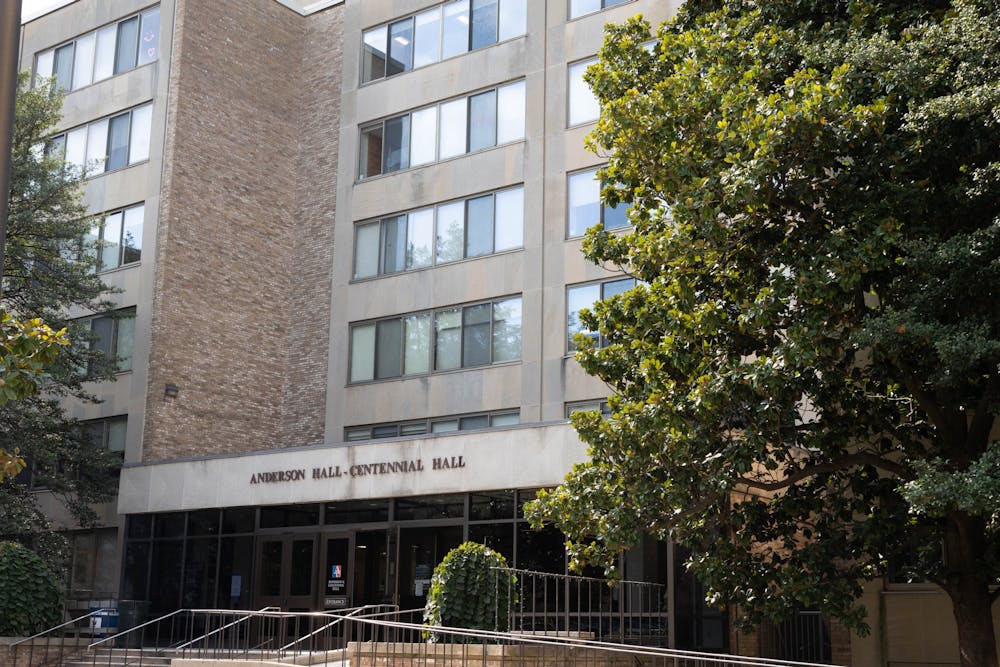Editor’s note: Darya Iranmanesh is a staff columnist for The Eagle. Iranmanesh was not involved in the reporting, writing or editing of this story.
In her first week on campus, freshman Darya Iranmanesh faced two separate incidents where her visual impairment accommodations approved by American University’s Academic Support and Access Center (ASAC) were not met.
During the move-in period, Iranmanesh tried to bring her boyfriend and father up to her dorm room to assist her with getting ready. However, according to Iranmanesh, the front desk at Anderson Hall told her that this was against the guest policy. Up until Aug. 30, pre-registered family members were only allowed into the residence halls on the day the student was actively moving in, Chief Communications Officer Matthew Bennett told The Eagle in an email.
“I struggled to get up to my room independently, I eventually found it after getting lost,” said Iranmanesh, a student in the College of Arts and Sciences and School of Public Affairs. “Then, once I was in my room, it was really hard for me to match clothes and get things.”
During the second incident, Iranmanesh’s Personal Care Assistant (PCA), graduate student Julia Trainor, was initially denied access to the residence hall. Trainor’s One Card had not yet been activated because the office had closed after she and Iranmanesh had arrived back from the Explore DC program the day prior.
“I tried to enter the building, and I was approached with a little bit of an aggressive and hostile response, which I totally understand,” Trainor said. “COVID-19 is legit, it’s a very scary time. But I just kind of felt immediately shut down when I tried to explain what I was there for and how I was trying to assist Darya.”
Although Trainor had approved PCA emails from ASAC, it wasn’t enough.
“PCAs require activated OneCard access for the residence hall,” Bennett wrote. “Without an activated OneCard, access cannot be permitted per our security policies and email documentation is not an accepted substitute.”
Trainor was then let up after twenty-five minutes, resulting in Iranmanesh missing convocation with the rest of Anderson Hall. In a statement to The Eagle, Bennett wrote that the University is committed to supporting all students. Bennett wrote that students with accommodations should register with ASAC, where they can meet with a staff member to review their request.
After these incidents, Iranmanesh took to Instagram to share her story, where fellow AU students reposted it and called for more action on her behalf.
“It was really helpful that a lot of people were willing to help,” Iranmanesh said. “So I think that a lot of people, when they started hearing about the situation, kind of stepped their game up.”
The administration has since stood by its guest policy.
“While the COVID health and safety protocols limiting visitors to the residence halls are critical to the well-being of our community, students with specific accommodation requests that involve access to the halls should reach out to ASAC,” Assistant Vice President for Community & Internal Communication Elizabeth Deal said.
Claire Kolmansberger, a freshman in the School of International Service and School of Public Affairs, has also struggled with unmet accommodations.
Kolmansberger requested a single dorm room, among other accommodations, due to her disability and a hip surgery she recently received. After being denied a single room multiple times, Kolmansberger received one twelve days before move-in, after her doctors cited the Americans with Disabilities Act of 1990.
When Kolmansberger requested assistance in walking to class and carrying her backpack, she was told by ASAC she could hire someone herself.
“I was walking, carrying my backpack with crutches and I was not supposed to be carrying weight on my back at that point,” she said. “But it just did not make monetary sense to hire someone to walk with me for five minutes.”
Kolmansberger’s friends stepped up to assist her, but she added that she doesn’t believe it’s their job to do so.
“My friends have lives, they have class, homework, they have things to do, whereas the University, their job is to serve us,” Kolmansberger said. “We pay them to be here for us.”
Iranmanesh said these incidents among disabled students bring to light the struggles the disabled community at AU has faced since the pandemic, and how disabled individuals are disproportionately affected by COVID-19.
“[COVID-19] definitely affected me and I’ve definitely lost accommodations,” Iranmanesh said. “I know a lot of students have been frustrated, and I know COVID-19 hasn’t made things easy for anyone, and I think the disabled community has been hit hard by the pandemic.”





